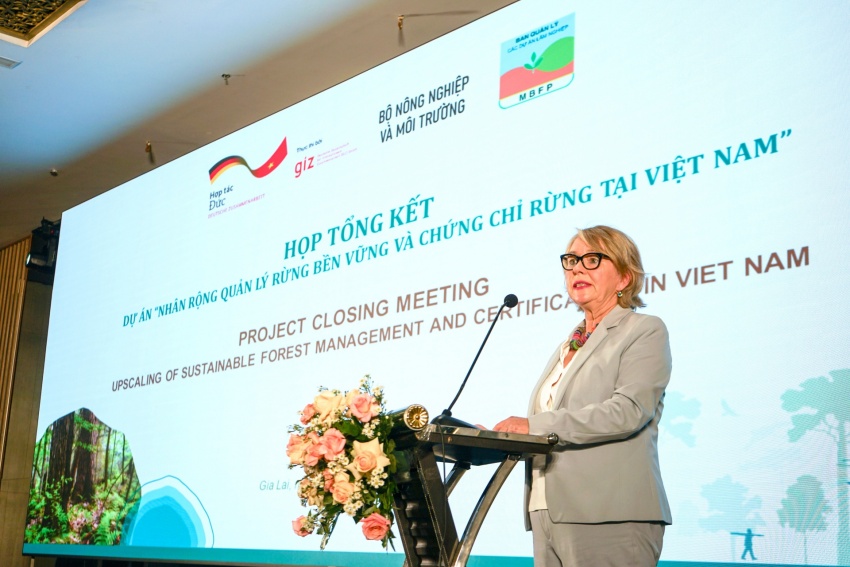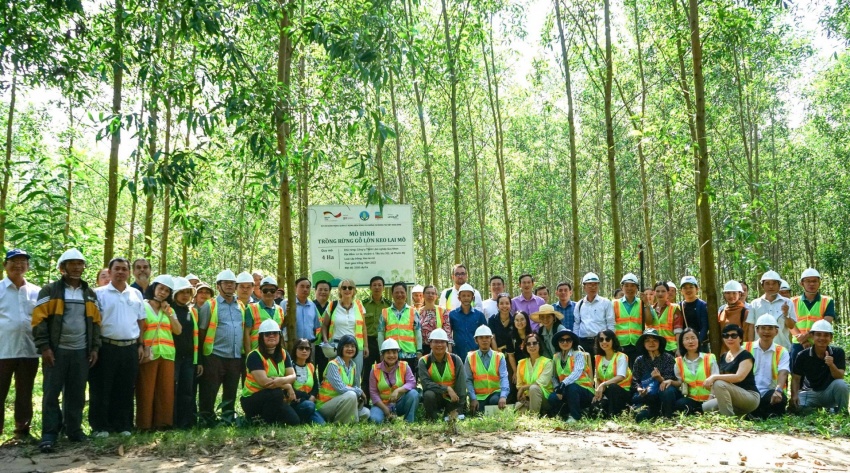
The German Development Agency (GIZ), in collaboration with the Ministry of Agriculture and Environment (MoAE) and relevant parties, on September 15 held the closing meeting of the sustainable forest management upscaling project.
It was a collaborative initiative funded by the German government, implemented in Hanoi, Quang Tri, Gia Lai (formerly Binh Dinh), and Phu Yen, to promote sustainable forestry practices and the certification of planted forests.
It involves the MoAE, provincial authorities, the Management Board of Forestry Projects, and GIZ as key implementers and partners.
“With a volume of €4.7 million ($5.5 million) provided by the German government over the last four years, it is part of the larger portfolio in this area reflecting our shared commitment to sustainable development and climate action,” Michaela Baur, country director GIZ Vietnam, said.
The scheme contributed to establishing legal and institutional prerequisites. It advised what is now the MoAE on amending rules on the restructuring and development of state-owned agricultural and forestry companies. Based on a consultative process, amendments included increased economic incentives for agricultural and forestry companies; clarification of land use rights and responsibilities among national and provincial authorities; and promotion of innovation and digitalisation. Results were taken up in Decree No.04/2024/ND-CP, issued in 2024.
The venture has achieved numerous notable results during its implementation, significantly contributing to sustainable forest protection and development. The six forest owners, including state-owned forest companies and protection forest management boards partnering with the project, have each established demonstration plots for sustainable forest management. As a result, 42.5 hectares of demonstration areas and 2,118.5ha of expanded forest areas were established, including six hectares of native tree planting.
Alongside forest expansion, the scheme has also promoted research and the supply of planting materials. Notably, 150 containers of hybrid acacia seedlings were provided, and the team successfully nurtured plots of Terminalia catappa, a native tree species with high ecological value.
The initiative introduced livelihood models under forest canopies, such as growing Ganoderma mushrooms at the Ben Hai and Thach Han protective forest management boards in Quang Tri. With a scale of 150 sq.m per model, these mushroom sites harvested three crops per year, yielding 54 kg in 2025 at approximately $16 per kilogramme, opening a promising avenue for agroforestry economics.
Moreover, two timber forest business models at Quy Nhon and Song Kon Forestry companies recorded annual net incomes of $8,160 per ha and $1,560 per ha, respectively. Additionally, two joint-venture plans were implemented across 1,795ha to bridge financial gaps during the transition to large-scale timber forests.

One of the achievements was gender mainstreaming. The project is committed to gender equality and social safeguards. For instance, two forestry companies developed their gender action plan to mainstream gender equality in their operation. Gender equality aspects are now considered in their recruitment policy to ensure equal opportunities for women and men.
These efforts also contribute to fulfilling the requirements of the companies for forest certification, namely, increasing the value of their timber production. A gender forum was organised for forest owners and other actors in the timber value chain and developed recommendations for strengthening gender equality in policy and practice. The 150 participants had the opportunity to connect and forge alliances with like-minded peers in the sector.
“The initiative has significantly contributed to enhancing sustainable forest management capacity, transitioning planted forests to longer cycles to improve timber quality, enhance carbon sequestration, protect the environment, and provide economic benefits to forest owners,” said Nguyen Van Hoan, deputy director of the Gia Lai Department of Agriculture and Environment.
It has improved livelihoods for local communities while promoting the role of women and farmers in forest protection and development. In Gia Lai province, the project has delivered tangible results, particularly in increasing the economic value of forests while protecting the environment and addressing climate change, Hoan said.
“While the project has concluded its support activities, the responsibility to continue and scale up the model will be carried forward by provinces, forest owners, and communities. Gia Lai province will actively engage and strive to maximise the outcomes, scaling up sustainable forest management models and transitioning planted forests to longer cycles to achieve higher economic and environmental benefits,” Hoan added.
The success is reflected in the report of the results achieved in the past four years, and are the foundation for maintaining and replicating the model. Specifically, forest owners commit to continue to care for and protect according to the technical guidelines of sustainable forest management, allocate the necessary financial resources to maintain and replicate the model, and train workers for the sustainable transition process.
“Although the project has come to an end, I am sure the results will continue to contribute to sustainable forest management in Vietnam,” said Baur of GIZ Vietnam. “Following the agreement between our two governments, made during the negotiations in 2023, the forest sector is one of the priority areas of the German-Vietnamese bilateral cooperation. It includes sustainable forest management and forest protection, as well as legal and sustainable timber value chains.”
Nguyen Kim





